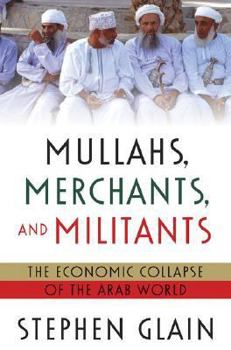Mullahs, Merchants, and Militants: The Economic Collapse of the Arab World
Select Format
Select Condition 
Book Overview
A thousand years ago, a vast Arab empire stretched from the Asian steppe across the Mediterranean to Spain, pioneering new technologies, sciences, art and culture. Arab traders and Arab currencies dominated the global economy in ways Western multinationals and the dollar do today. A thousand years later, Arab states are in decay. Official corruption and ineptitude have eroded state authority and created a vacuum that militant Islam has rushed to fill...
Format:Hardcover
Language:English
ISBN:0312329113
ISBN13:9780312329112
Release Date:June 2004
Publisher:Thomas Dunne Books
Length:350 Pages
Weight:1.54 lbs.
Dimensions:1.2" x 6.4" x 9.6"
Customer Reviews
4 ratings
Money makes the world go round, and the lack of money...
Published by Thriftbooks.com User , 17 years ago
History and economics are often taught as separate disciplines in schools public and private. This is unfortunate as they are thoroughly intertwined at all levels of life and society, from courtship, family structure, cities, states, nations and empires. This book does a great job of connecting history and economics together into a cogent diagram of the Middle East. The book was written by a journalist who has spent a lot of time on the ground in the Middle East over the past 20 years, most of it dealing and living with locals. The author divides the book into chapters, one for each of the major areas with a long history; Egypt, Palestine, Syria, Jordan, and Iraq. In each one, the author provides a short history of past glories, more recent colonial experiences, and current troubles under the auspices of dictatorships, and sometimes war. The overarching theme throughout all the chapters is that economic decline has given rise to Islamic fundamentalism and a host of other bad government policies. The economic decline is attributed to imperialistic policies of divide and conquer, over-dependence on oil, Cold War politics, and the trumping of economic common sense by nationalistic urges and political grudges. The book is lacking on several points. The most prominent is that it essentially ignores the Arabian countries of Kuwait, Saudi Arabia, Yemen and the UAE. The book also forgets about Libya and Qadafi, probably one of the most interesting Arab leaders of late. But overall, it is still a great book and a great study of the Middle East's problems.
Looking beyond theology .
Published by Thriftbooks.com User , 19 years ago
I found this book riveting. The messages come from firsthand encounters with people rarely covered by the U.S. mass media. The concern for economics and business is a valuable complement to the excellent writing of Karen Armstrong, with her profound insights into religious and cultural patterns. The value of this book is magnified given the drivel, propaganda, and ideological/theological obsessions that characterize most U.S. reporting and analysis of the Middle East.
A coverage of the economic collapse of the Arab
Published by Thriftbooks.com User , 20 years ago
A coverage of the economic collapse of the Arab world might seem incongruous, but Stephen Glain's analysis in Mullahs, Merchants & Militants surpasses the usual history and contemporary political analysis to focus on an under-covered area: the region's economic structure. Chapters examine sustained economic decay in the region and its impact on political instability and extremism, recounting the ongoing decline of the Arab empire and its increasingly limited ability to pioneer new technologies and sciences. Stephen Glain was the Wall Street Journal's Middle East corespondent from 1998-2001: his familiarity with the region and his in-depth history adds a depth and dimension to discussions of economic instability.
A question of economics
Published by Thriftbooks.com User , 20 years ago
Although a journalist for the Wall Street Journal wouldn't pass as an historical materialist, a stethoscope put to the economic malaise of the Arab world fairly threatens to uncover the prime mover of its current troubles. With a series of vignettes hopscotching through Lebanon, Syria, Palestine, Iraq, and Egypt, the author produces a significant diagnosis, with an emphasis on capitalist fundamentals that isn't market mania. Indeed, there is an ambiguity here. For all the emphasis on democratic capitalism by the West you have to wonder if these crocodile idealists with a nasty penchant for imperialism could havew done a better job crippling Arab economies if they had set out to do so deliberately. And the crippling of the economic potential of Palestine ranks as a bit of glaring contradiction to stated objectives.With so much money at stake in the status quo, it's better to blame Arafat. Beyond that, the social mix of dictators and elites in the Middle East as portrayed is not a nice picture, and the degree of incompetence shown gets the silver metal after the Western powers for sheer botch. The destruction of the Iraqi economy is especially depressing, as is the current American initiative amounting to considerable propaganda and the inability to restrain one's Halliburton compulsions. As the author notes, the systematic exclusion of Iraqi's from their own reconstruction fairly well shows the game in action, behind the market hype. The Iraqis had the electrical grid up and running in a few weeks after the first Gulf War. Briskly informative and useful account.





